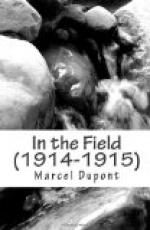“And what is there in that large white building, where the windows are alight?”
The good woman explained that it was a convent, where nuns took in the old people of the country. They could not give lodging to soldiers. But B. had already made up his mind; that was where we were to sleep. Leaving the old woman aghast, he went with long strides to the iron railing which surrounded a little garden in front of the convent. I tried in vain to make him understand that we could not invade these sacred precincts.
“Leave it to me,” he said, “I’ll speak to them.”
He pushed the iron gate, which opened with a creak, and I shut it after him. I felt somewhat uneasy as I followed B., who crossed the garden with a rapid stride. I felt uneasy at the thought of his essentially military eloquence, and of the use to which he proposed to put it. But I knew, too, that he was not easily induced to abandon a resolution he had once taken. True, he did not often make one, but this time he seemed to be carrying out a very definite plan. The best thing was to submit, and await the result of his attempt. We went up three steps, and felt for the knocker. “Here it is,” said B., and he lifted it and knocked hard. What a dismal sound it made in that sleeping town! I felt as though we had just committed an act of sacrilege. We listened, and heard, through the door, the noise of chairs dragged over the stone floor; then a light footstep approaching, a sound of keys and bolts, and the door was gently opened and held ajar.
“Sister,” said B., with a bow, “what we are doing is, I know, most unusual; but we are dying of hunger and very tired, and, so far, nobody has been willing to open their door to us. Could we not have something to eat here, and sleep in a bed?”
The Sister looked at us and appeared not to understand. However, I was more at ease when I saw she was neither frightened nor displeased. She was a very old nun, dressed in black, and held in her hand a little lamp which flickered in the night breeze. Her face was furrowed with deep wrinkles, and her skinny hand, held before the lamp, seemed transparent. She made up her mind at once. Her face lit up with a kind smile, and she signed to us to come in, with words which were probably friendly. This was a supposition, for the worthy nun only spoke Flemish, and we could not understand anything she said. She carefully pushed the bolts again, placed her lamp on the floor, and made a sign to us to wait. Then she went away with noiseless steps, and we were left alone.
“You see,” said B., “it is all going swimmingly. Now that we have got in, you must leave everything to me.”
The flickering lamp lighted the hall dimly. The walls were bare, and there was no furniture but some rush chairs set in a line against the partition. Opposite the door, there was a simple wooden crucifix, and the stretched-out arms seemed to bid us welcome. A perfume of hot soup came from the door the old Sister had just shut.




